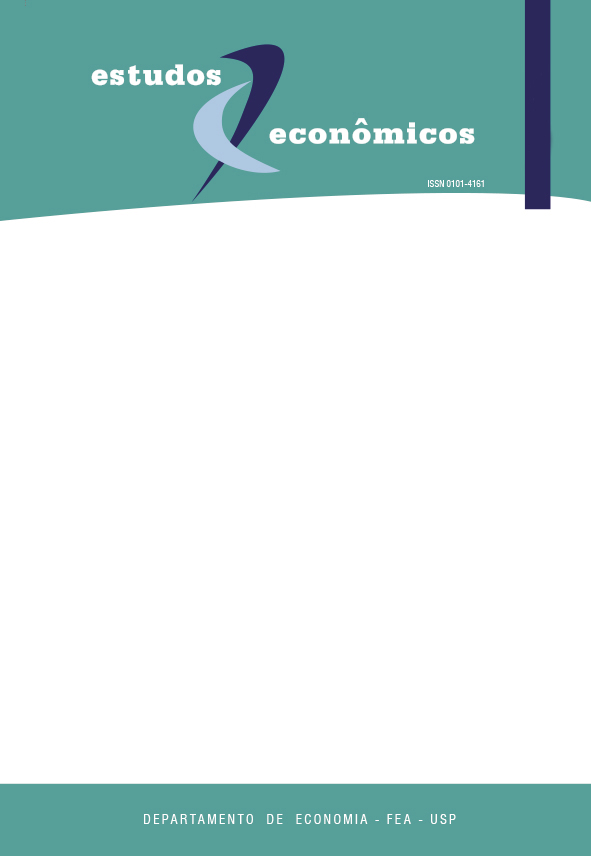Diagnosticando patologias monetárias: seus impactos sobre a atividade produtiva na visão de Keynes e Veblen
DOI:
https://doi.org/10.1590/S0101-41612006000200005Keywords:
moral, ethics, monetary pathology, production activityAbstract
This paper, which draws upon Keynes' conception of monetary pathologies, focuses on the psychological dimension of monetary relations - money-loving and money-making - and their impacts on the production process and social well-being. In an attempt to provide a more elaborated analytical and theoretical foundation to such conception, we also draw upon some of Veblen's writings, with a view to suggest some tentative answers to an intriguing question one may raise upon reading Keynes' 1930 essay "The economic possibilities for our grandchildren": why - and how - would come about a change of values such as the one envisaged by Keynes, which would lead people to assess the money-motive at its true value, as a pathology, and to devote major attention to the true art of good life?Downloads
References
Albin, Peter S. Barriers and bounds to rationality: essays on economic complexity and
dynamics in interactive systems. With an Introduction by Duncan K. Foley. Princeton: Princeton University Press, 1988.
Almeida, M. H. T. Apresentação de Thorstein Veblen (1899) A teoria da classe ociosa.
Coleção “Os Economistas”. São Paulo: Abril Cultural, 1983.
Bridel, P.; Presley, J. John Maynard Keynes and the French connection. The Manchester
School, v. LXV, n. 4, p. 452-465, Sept. 1997.
Carabelli, A. The methodology of the critique of the classical theory: Keynes on organic
interdependence. In: Bateman, Bradley W.; Davis, John B. (eds.), Keynes and philosophy. Edward Elgar, 1991.
Cardoso, F.; Lima, G. T. A visão de Keynes do sistema econômico como um todo
orgânico complexo, Anais Eletrônicos do XXXIII Encontro Nacional de Economia (Anpec), Natal, Dezembro 2005.
Davis, J. B. Keynes’s view of economics as a moral science. In: Bateman, Bradley W.;
Davis, Jonh B. (eds.), Keynes and philosophy. Edward Elgar,1991a.
Davis, Jonh B. Keynes’s critiques of Moore: philosophical foundations of Keynes’s economics.
Cambridge Journal of Economics, v. 15, p. 61-77, 1991b.
Dequech, D. Uncertainty: individuals, institutions and technology. Cambridge Journal of Economics, v. 28, n. 3, p. 365-378, 2004.
Edgell, S.; Tilman, R. The intellectual antecedents of Thorstein Veblen: a reappraisal. Journal of Economic Issues, v. XXIII, n. 4, Dec. 1989.
Fitzgibbons, A. Keynes’s vision. Oxford University Press, 1988.
Foster, G. P.; Ranson, B. Thorstein Veblen on money and production. Economies et Sociètes, Tome XXI, n. 9, Sept. 1987.
Gribbin, J. Deep simplicity: bringing order to chaos and complexity. London: Random House, 2005.
Hutton, A. Institutionalism: old and new. In: O’Hara, P. (ed.), Encyclopedia of political
economy, V. I. London: Routledge, 1999.
Keynes, J. M. [1926)]. O fim do ‘laissez-faire’. In: Szmrecsányi, Tamás (org.), John
Maynard Keynes. Editora Ática, 1984.
Keynes, J. M. [1930]. The economic possibilities for our grandchildren. In: Szmrecsányi,
Tamás (org.), John Maynard Keynes. Editora Ática, 1984.
Keynes, J. M. [1930]. A treatise on money. In: Moggridge, D. (ed.), The collected writings
of John Maynard Keynes. V. VI. London: Macmillan, 1971.
Keynes, J. M. [1931]. Essays in persuasion. In: Moggridge, D. (ed.), The collected writings
of John Maynard Keynes. V. IX. London: Macmillan, 1972.
Keynes, J. M. [1933]. Alfred Marshall. In: Moggridge, D. (ed.), The collected writings of
John Maynard Keynes. V. X. London: Macmillan, 1972.
Keynes, J. M. [1937]. A teoria geral do emprego. In: Szmrecsányi, Tamás (org.), John
Maynard Keynes. Editora Ática, 1984.
Keynes, J. M. [1938]. My early beliefs. In: Moggridge, D. (ed.), The collected writings of
John Maynard Keynes. V. X. London: Macmillan, 1972.
Keynes, J. M. The general theory and after. Parte II: Defense and development. In: Moggridge,
D. (ed.), The collected writings of John Maynard Keynes. V. XIV. London: Macmillan, 1973.
Lima, G. T. Em busca do tempo perdido: a recuperação pós-keynesiana da economia do
emprego de Keynes. Rio de Janeiro: BNDES, 1992.
Mini, P. Keynes, Bloomsbury and the general theory. Basingstoke: Macmillan, 1991.
Mitchell, W. C. Types of economic theory: from mercantilism to institutionalism. New
York: Kelley, 1969.
O’Donnell, R. M. Keynes: philosophy, economics & politics. London: Macmillan, 1989.
Preston, R. H. The ethical legacy of John Maynard Keynes. In Reese, David A. (org.),
The legacy of Keynes. San Francisco: Harper & Row, 1987.
Stabile, D. The intellectual antecedents of Thorstein Veblen: a case for John Bates
Clark. Journal of Economic issues, v. 31, n. 3, p. 817-825, Sept. 1997.
Skidelsky, R. John Maynard Keynes – The economist as saviour 1920-1937. New
York: The Penguin Press, 1992.
Veblen, T. B. [1899]. A teoria da classe ociosa. Coleção “Os Economistas”. São Paulo:
Abril Cultural, 1983.
Veblen, T. B. [1904]. The theory of business enterprise. New York: Kelley, 1965.
Veblen, T. B. [1919]. The vested interests and the common men: modern point of view and the new order. New York: Kelley, 1919.
Winslow, E. G. Keynes and Freud: psychoanalysis and Keynes's account of the 'animal spirits' of capitalism. Social Research, v. 53, n. 4, 1986.
Downloads
Published
Issue
Section
License
Copyright (c) 2006 Fernanda Cardoso, Gilberto Tadeu Lima

This work is licensed under a Creative Commons Attribution-NonCommercial 4.0 International License.
By submitting an article, the author authorizes its publication and attests that it has not been submitted to any other journal. The original article is considered final. Articles selected for publication are proofread for grammatical and orthographic errors. The journal does not pay rights for published articles. The Institute of Economic Research from the School of Economics, Business and Accounting of the University of São Paulo (Instituto de Pesquisas Econômicas da Faculdade de Economia, Administração e Contabilidade da Universidade de São Paulo) owns the journal's copyright.




